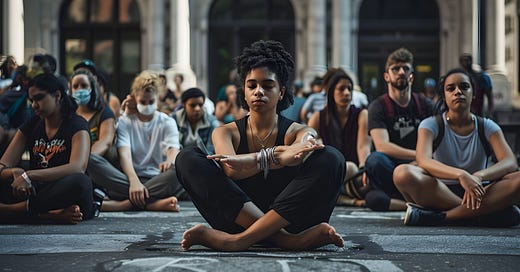Sacred Activism: If Your Stillness Doesn’t Break Complicity, It’s Just Privilege in Disguise
A Short Note
This reflection opens an ongoing series on sacred activism—a journey into the place where prayer and protest meet, and where the inner life fuels our engagement with the world.
At the heart of everything that exists, there is a quiet, living presence—a sacred energy that moves all things toward wholeness, toward justice, toward communion. It is not distant. It is not elsewhere. It is here, now, breathing through the fabric of life.
Saint Paul, sensing the fullness of this mystery, dared to proclaim that one day God will be all in all. That is not a promise of escape. It is a call to alignment.
To discover our vocation is not to climb toward a shining ideal, but to yield to the flow of this sacred movement. It means letting ourselves be carried by what is most deeply true—what the mystics call the will of God or simply life itself. The life that pulses in all life.
Contemplative practice is the space where we learn this yielding. It is the practice of becoming still—not to withdraw from the world, but to touch it more deeply. To sit in silence is to listen beneath the noise, to remember that before we act, we must receive. Before we strive, we must consent.
The first movement is receptivity. The second is consent.
And when we consent—truly and humbly—something begins to happen. That sacred energy takes whoever we are—tired or tender, broken or burning—and begins to transfigure it. Not by bypassing the mess of our lives, but by entering it. It is here, in this body, in this struggle, in this contradiction, that the sacred wants to dwell.
This is not a spirituality of perfection. It is a spirituality of participation. We are not purified so we can join the work. We are purified in the work. In the giving. In the surrender. In the solidarity.
And so contemplation becomes the foundation of sacred activism. Not because it gives us peace, but because it aligns us with the deeper current—the one moving everything toward liberation. In this way, our actions for justice, our resistance to empire, our tenderness toward the earth, are no longer efforts of the ego. They are movements of grace.
Each time we sit in stillness, we return to that sacred current. And each time we rise, we are invited to carry its flow into the world—not as heroes, but as participants in the great unfolding where God becomes all in all, where justice and mercy embrace, and where our very lives become a gift.
And this is the risk of true consent. Because when we say yes to the flow of God, we are not saying yes to comfort or control—we are saying yes to transformation. That flow will break us open. It will dismantle every quiet agreement we’ve made with injustice—undoing even our need to stay uninvolved or neutral. The contemplative path doesn’t lift us above the world’s pain. It opens us to God’s longing for liberation, moving through our bodies, our choices, our lives. This is how the flow of God breaks and remakes us—until there is no longer space in us for complicity, only for communion.
Then the work of contemplation and the work of justice become one. The work of completing ourselves—and completing the world.





A wise and needed word, Adam. Too many mistake stillness for retreat, forgetting that the deepest silence is not passive—it is a tuning fork for holy disruption. If your contemplation leaves empire unchallenged, it’s just another spa treatment for the ego. The true stream will drag your comfortable self into the river—and teach you to swim toward liberation.
—Virgin Monk Boy
Being still and knowing that God is God takes us into God's heart--a heart of love for the world.